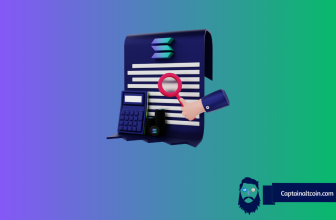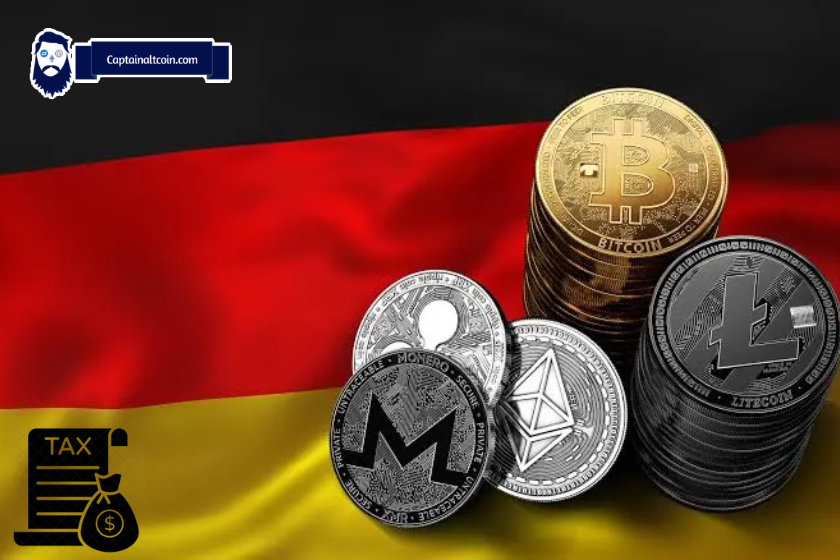
What you'll learn 👉
Intro
Germany is one of the most crypto-friendly countries in the world, especially compared to other European nations.
The concept of crypto is a digital representation of value that is not created nor guaranteed by a central bank or other public institution. For taxes purposes in Germany, they are therefore not considered to be currencies but rather private assets.
If you’re planning to trade digital currencies in Germany, it’s important to understand how taxes work here.
How much tax do you pay on crypto in Germany?
As private assets, cryptos don’t attract Capital Gains taxes like equities or stocks.
Cryptos held for more than a year are exempt from taxation in Germany, as profit from private sales transactions involving cryptos that earn less than 600 Euros in profit in a calendar year.
Any profits made from buying or selling digital currency for fiat money, exchanging one crypto for another, or paying for products and services with crypto must all be reported and taxed in Germany.
If you hold onto your coins for one year without selling them, you won’t owe any tax. This is great news if you’re a German crypto investor who has the patience to not sell their coins too soon. Germany is the biggest supporter of HODLING.
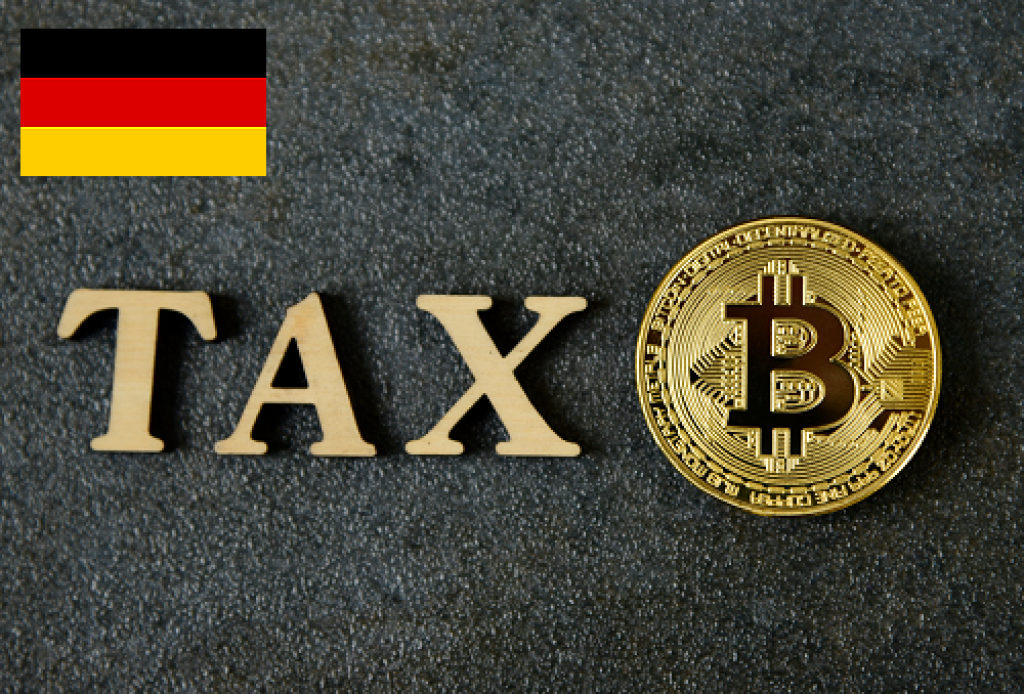
Can the BZSt track crypto?
The BZSt (German tax authority) can track cryptos such as Bitcoin and Ethereum. This is because the agency has access to information held by European crypto exchanges. In addition, the BZSt can see if a person holds multiple accounts and what those accounts are used for.
EU’s Sixth Anti-Money-Laundering Directive came fully into effect on June 3, 2021, companies providing financial services to crypto customers must comply with much tougher regulations regarding identifying customers.
Data is shared among EU countries in a bid to stamp out money laundering and illegal activity.
Germany’s crypto tax rates
All short-term crypto gains in Germany are subject to income tax at your own marginal rate. This means that your tax rate on your crypto earnings could range from 0% to 45%, depending on how much money you made overall during the tax year.
| Income | Single | Married |
| 0% | €0 – €10,347 | €0 – €20,694 |
| 14 – 42% | €10,348 – €58,596 | €20,695 – €117,192 |
| 42% | €58,597 – €277,825 | €117,193 – €555,650 |
| 45% | €277,826+ | €555,651+ |
The 5.5% solidarity surcharge tax that is added to the tax bills of single filers who pay more than €16,956 and married filers who pay more than €33,912 is not included in the table above.
Accounting methods
The value of cryptos fluctuates constantly. This makes it difficult to calculate their true worth. In addition, there are different ways to determine the price of a crypto asset. Some experts say that the most important thing is to know what the valuation method you choose will be. Which one you use depends on whether you want to sell or buy crypto. There are three main valuation methods:
- FIFO – First-in-first-out method – The first coin that is counted for sale is the first coin that you buy (in chronological order).
- LIFO – Last-in-first-out method – LIFO operates in complete opposition to FIFO. You sell the most current coins that arrived rather than the first ones you bought (i.e., the most recent coins you acquired).
- HIFO – Highest-in-first-out method – It operates as it is supposed to. The coins with the highest cost basis (original purchase price) are the ones that are sold first.
German Federal Ministry of Finance published guidelines for calculating the fair market value of crypto assets. These guidelines state that the FIFO method is the best option. The tax authorities generally accept the FIFO method because it is easier to understand and apply.
How to calculate capital gains in Germany?
Capital gains are calculated differently in Germany compared to most countries around the world. In Germany, the capital gains tax depends solely on whether the taxpayer is a resident of Germany or not. If you live outside Germany, you don’t pay taxes on capital gains made within the EU. However, there are some exceptions. For example, you’re taxed on certain types of dividends received from foreign companies.
If you’re living in Germany, however, you’ll still be subject to income tax on capital gains. You can deduct capital losses from taxable income up to €10,000. Capital losses can offset capital gains, but only up to the number of capital gains that you’ve already deducted.
The selling price is simply the market value of the crypto at the time of the sale. This includes the price paid for the coin plus any fees associated with the trade. So, if you bought Bitcoin for €1,500 and sold it for €2,700, the capital gain would be €600.
Germany: no tax if you hold Bitcoin for one year
According to rule 23 EStG, private sales that do not exceed 600 euros are tax exempt. But perhaps even more interesting are the rules regarding holding cryptos for longer periods of time. Here’s what we know:
If you hold your BTC, LTC, ETH, XRP, or other cryptos for less than one year, you don’t pay any taxes.
But if you hold them for less than one year, there is an option not to pay tax on the gains again. How does this work? Let’s say you purchased Bitcoin for 10 euros, and now it’s worth 30 euros. You’d still owe no taxes because you haven’t exceeded 600 euros.
This is especially useful considering Germany’s high stock market volatility. When the price of Bitcoin goes up, you could easily end up paying more tax than you originally owed.
Taxable transactions in Germany
Crypto investors in Germany potentially must pay taxes on every transaction involving digital currencies. This includes buying cryptos, selling them, trading them, mining them, holding them, losing money on them, and even lending them out.
The German Federal Institute for Taxation (BMF) published a set of guidelines regarding crypto taxation in 2017. In 2018, the BMF updated those guidelines to include additional information about how cryptos are treated under German law.
As long as you’re keeping track of your crypto investments, you won’t owe taxes on your crypto holdings. But if you forget to report your crypto transactions, you could end up owing taxes on what you didn’t report.
Selling cryptocurrency for fiat currency within 1 year
In Germany, selling cryptos for fiat currencies is subject to capital gains taxes. If you sell digital coins within 12 months, you must report the transaction to the German Federal Finance Office (BEF). Unless the total amount is under €600, then you pay nothing in taxes.
Only when your total short-term profit for the tax year surpasses €600 are you subject to tax.
Selling crypto for another crypto within 1 year
As long as the holding period does not exceed a year, trading one kind of crypto for another is taxable. The total profit from exchanging one coin for another must surpass 600 euros for it to be taxable in Germany during the tax year.
The gain is the difference between the selling and buying prices after converting sales profits to euros. If it’s hard to tell if a sale occurred before or after the exchange, the fair market value of each crypto on the exchange day must be used.
Participating in an ICO/IEO
An ICO (Initial Coin Offering) or IEO (Initial Exchange Offering) refers to a situation where investors are purchasing tokens/coins in a newly launched crypto/company.
From a German tax perspective, there is no difference whether you buy the new token directly in fiat currency or indirectly by buying another crypto. In both cases, the taxable event is triggered on day one of the ICO/IEXO transaction, when you receive your new tokens.
When you sell the new tokens later on, the cost basis of the transaction is the price that you paid for the tokens on day one.
You will only be taxed if the new coins are disposed of within a year from purchase.
Getting paid in Bitcoin or cryptocurrency
If you work for yourself or for someone else on a freelance basis, it could be worth thinking about how much money you’re receiving in crypto. If you receive payments in bitcoin or another coin, you’ll want to know whether you need to pay tax on those earnings.
The good news is that there’s no need to panic. All you need to do is report what you’ve earned. Received income is taxed at market value at the time you received it. You’ll find out how much you owe in taxes on your next tax return.

Tax on cryptocurrency mining rewards
What is important to know with regards to taxes is that hobby miners with an annual turnover of under €256 do not need to report their income to the Bundeszentralstelle für Steuern (BZSt). If you go over the limit, the extra money is treated as ordinary income and subject to income tax, just like any other kind of income would be.
You are also allowed to deduct certain directly related costs from the total profits, such as hardware or electricity costs. These deductions must, however, be declared separately in the tax return.
Tax on cryptocurrency staking rewards
Staking rewards are treated similarly to mining rewards in terms of their tax treatment. In Germany, anyone who earns money from staking coins must declare the income and pay taxes accordingly. If the total amount made during the tax year exceeds €256, then the holder is liable for income tax.
Tax on cryptocurrency airdrops
BMF has clarified that the airdrop of cryptos or tokens is taxable income.
There are many different ways to conduct airdrops, including giving out tokens directly to wallets or exchanges or distributing tokens via giveaways like sweepstakes or contests. Also, some airdrops require users to take certain actions, such as sharing a post on Facebook or Twitter.
If you did nothing to earn the airdrop, the airdrop itself is considered tax-free under the Income Tax Act. But if you provide a service in return for receiving the airdrop, it becomes taxable.
Tax on received interest
If you lend crypto on an exchange or DeFi protocol and are paid interest on the collateral you submitted, you must report the interest income on your tax return. It is the fair market value that is used to figure a gain or loss that should be recorded for tax purposes.
Other crypto income
Salary payments in crypto are treated as regular salaries by the BMF. Thus, it is taxable just like any other income received in euros.
Tax-free transactions in Germany
As we already repeatedly mentioned, the biggest advantage for Germans who hold cryptos is that they don’t pay taxes on their gains if they keep them for more than one year. This encourages long-term investors and the so-called HODLers who buy and stash away their coins.
Buying cryptocurrency with fiat (Ex: EUR → BTC)
It is not considered a taxable event by the BMF or BZSt when fiat currency is used to purchase cryptos. Only the currency disposed of is taken into account for income tax purposes. This is due to the fact that financial outcomes are determined only by the value of the currency at the selling point.

Selling cryptocurrency after 1 year
If you buy crypto and keep it for a year or longer, you won’t have to pay income taxes on the profits you make from selling those cryptos, that is, after a year, any crypto, once free of tax, always is free of tax. These gains you don’t need to report to the BZSt.
Gifting cryptocurrency
In Germany, it is possible to gift crypto assets without paying taxes. This applies to individuals. The threshold amounts vary depending on whether the person receiving the gift is a close friend or family member. The amount of crypto that can be gifted is limited to €20,000 for friends and €500,000 for family. Gifts above this limit are subject to taxation.
Selling of staked cryptocurrency after 1 year
Your profits from selling staked digital assets in a decentralized protocol are taxable. There are exclusions that may allow you to avoid doing so under certain circumstances. After staking the tokens for at least a year, any earnings made from selling them are tax-free when the money is withdrawn.
Tax on cryptocurrency hard forks
If you receive crypto as a result of a hard fork, there is no taxation on it. If you sell the coins within a year, your gain will be subject to income tax in its entirety since your cost basis will be assumed to be zero.
How are crypto margin and futures trading taxes in Germany?
Many crypto traders have entered into margin and futures trading, hoping to make big gains in the crypto space. While this type of trading allows you to buy crypto with leverage – meaning you can invest much less than what you actually want to purchase – it comes with an increased risk. If things go wrong, you could lose everything. This is why many people prefer to trade without leveraging their accounts.
In Germany, margin calls are treated similarly to debt payments. As such, you’ll need to file a return each year detailing what you’ve earned from your crypto trading activities.
Taxes on lost or stolen crypto
Many people in the crypto realm, says the BZSt, lose access to their cryptos as a result of fraud or other forms of theft. You can claim a loss for your missing crypto, but under what conditions is not made clear.

In order to file a claim, one must provide proof of ownership of the crypto and show that the value of the asset decreased due to fraud or technical issues.
If you think you are eligible for a tax deduction, you can contact the Tax Office.
How to pay less tax in Germany?
There are ways to minimize your tax liability if you decide to put money into crypto. In other words, your tax burden can be lessened.
The best way to tax-free crypto is to buy some and keep it in your portfolio for at least a year. Disposals made after one year will be exempt from tax.
Under the German Income Tax Act, €600 in short-term investments and €256 in additional income are tax-free.
SCAM or Rug Pull – can you deduct this loss?
Yes. you are eligible to claim a capital loss if you discover that you have lost crypto as a result of a rug pull or a scam.
Can you deduct lost coins as a loss?
Any time you lose your crypto carelessly, it counts as a loss that is not deductible from your taxes. Cryptos stolen or private keys forgotten are not eligible for a tax break.
Can Ethereum gas fees be deducted?
Gas fees associated with the acquisition and use of cryptos are considered capital expenses. These costs must be included in the cost basis of the crypto being sold. In addition, there are certain types of transactions where the purchase price includes a fee paid to another party. For example, if you sell crypto to someone else, the seller may pay a commission to the buyer. This type of transaction is typically referred to as a “sale” rather than a “purchase.”
For most transactions, such fees are not deductible. However, if significant amounts of gas fees have been incurred during the course of a particular transaction, those amounts may be eligible for deduction. Taxpayers should consult a tax professional regarding whether the costs are deductible.
How is Gifting crypto to friends & family taxed?
Giving crypto as a gift is no longer considered a taxable event in Germany. In fact, if you give a friend or relative some digital currency, you don’t even need to report it to the German Tax Office. This is because giving crypto to anyone else is taxed like any other gift, according to a ruling published by the Federal Finance Ministry.
The decision states that there is no difference between gifting someone money via PayPal or handing over a physical coin. If you want to make sure that you don’t incur any taxes, you should avoid giving cryptos directly to people. Instead, you should transfer the coins into their exchange accounts or wallets. From there, the recipient can do whatever he wants with his funds.
This applies to both individuals and businesses. A person can gift up to €20,000 worth of crypto per year without incurring any additional taxation. Businesses can gift up to €500,000 annually without paying any extra income tax.
Is the purchase of an NFT taxable in Germany?
The sale of digital assets is generally considered a capital gain.
However, the purchase of an NFT is not directly taxable. Usually, only one crypto (e g, Ethereum, Solana, or Tezos) can be used on a decentralized marketplace such as Opensea or MagiEden. This means that at the moment of the purchase of an NFT, another crypto is sold. Depending on the holding period, this can lead to taxable events.
How are NFT trading profits calculated?
When trading with NFTs, investors should be aware that there is no way of knowing what the value of an NFT really is. When buying or selling an NFT, it is important to know how the profit and loss calculation works. If you trade with a crypto exchange, it is likely that you will receive a notification about taxes. In such cases, you must make sure that you calculate the profit and loss correctly. You could end up paying more tax than expected. Here’s how things work:
The price of the token is converted into Euros.
If you bought the NFT for less than €100,000, you would pay 20% VAT and income tax.
If you sold the NFT for more than €100,000, you would lose 60% VAT and income tax on the difference.
Can you deduct trading fees?
Most exchanges charge trading fees when buying, selling, or trading crypto. These fees are considered costs that are deducted from the sales price. They are fully deductible. If you have a large number of trades, deducting the trading fee can have a big impact on your overall tax liability.
Calculating your crypto taxes manually
If you want to calculate your crypto taxes yourself, you need to know what you have done with your cryptos. So far, most people haven’t been able to do it correctly because there are too many things involved. If you don’t know how to go about calculating your crypto tax liability, you might end up paying more money than necessary.
The good news is that you don’t need to hire a professional accountant to figure out your crypto taxes. You just need to download your transaction history from all exchanges you use (or, in the case of wallets, check your public wallet address and download all transactions on the blockchain explorer of your choice) and keep track of each transaction you make. Then you simply need to calculate your cost basis for every single one of those transactions. And finally, you need to identify all transactions that are considered dispositions and, therefore, taxable events under German law.
As you can see, this is a tedious and cumbersome process with a huge probability of an error. But, do not despair, the solution to it is in the next row.
Calculating your crypto taxes in Germany using crypto tax software
Coinledger
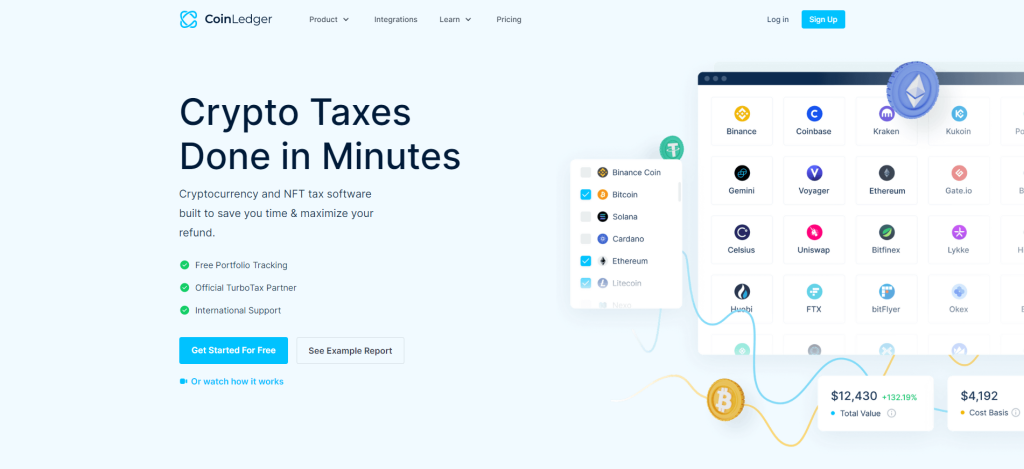
You may either get the data from the exchanges and manually upload it to the tax platform, or you can import it using API keys that you link to Coinledger. Unless you traded on a little, unrecognized crypto exchange, Coinledger interfaces with all major exchanges, so you probably won’t have any manual work to perform.
Koinly
Most exchanges have APIs that can allow Koinly to download your transaction history manually. If you don’t want to do this yourself, Koinly got you covered. Koinly offers a free version of the app that allows you to connect up to three different exchanges and one wallet. This way, you can use KoinLy without having to worry about downloading your transaction history manually.
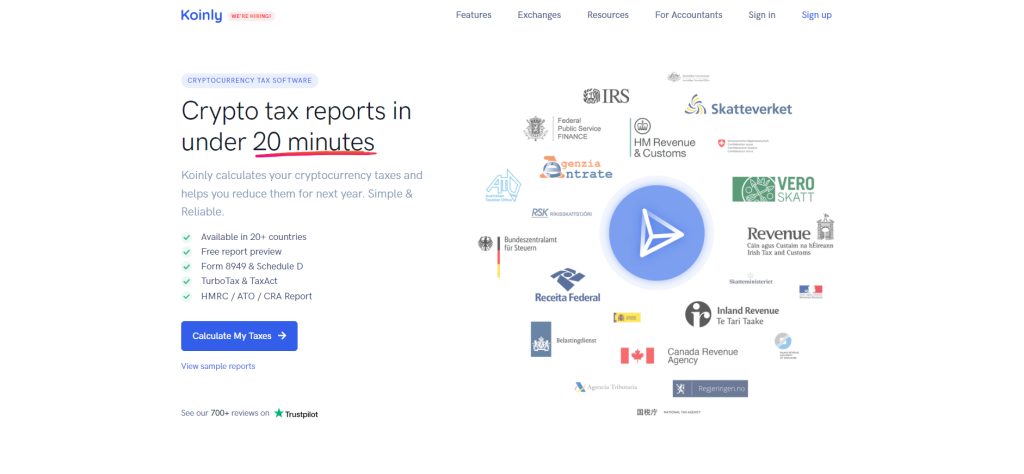
Also, you can download and import all your DeFi and NFT transactions from your wallet and import them into Koinly so it can do its thing.
If you’d like to add more than one exchange or wallet, it’s easy. Once you’re done adding your accounts, you’ll see a list of all the transactions that are associated with each account. Simply tap on the Account Name, and select Download Transactions.
Zenledger
A program for calculating crypto taxes called Zenledger interacts with popular crypto exchanges and wallets to compile transaction data and compute and generate crypto tax returns automatically. Additionally, it provides easy connections with well-known tax calculators, such as TurboTax.

Because ZenLedger’s software has been designed with CPAs and other professional accountants in mind, using it to manage many users within a single user interface. In addition to that, it provides tax forms for different regions and countries and has a separate, nifty tool for tax loss harvesting.
German Tax Deadline
The German tax year runs from Jan 1 to Dec 31. Technically, the tax filing deadline is on the 31st of July each year. But if this falls on a holiday, it will fall to the following working day.
If you are completing your tax returns for 2022, they must be filed by the end of February 2023.
Records of your transaction history
The German Federal Office for Information Security (BSI), or Bundesamt für Sicherheit in der Informationstechnik (BSI), published a guideline about how long digital currency traders must keep transaction records. They recommend keeping records for at least five years. This includes the date of each transaction, what crypto was sold or bought, the price of the crypto in Euro, and what the transaction was for.
How to file your crypto taxes to BZSt?
If you are earning money from crypto trading, it is important that you report your income correctly to the BZSt. You must declare your taxable income from crypto holdings, even if you don’t sell them. This includes profits from mining, owning ICO tokens, buying coins on exchanges, etc.
The taxable income needs to be declared in the annual tax return. If you use a broker like Coinbase Pro, Kraken, Bitstamp, Poloniex, Gemini, etc., you must file your returns using the online tool called ELSTER. The tax authorities provide detailed instructions on how to do this.
You can also file your crypto taxes using paper forms. These include Form 1040 and 1040A. However, there are some limitations to this method. For example, you cannot claim losses on capital gains incurred during the previous year. Also, you cannot claim deductions unless you have filed your annual tax return.
Read also:
- How to calculate crypto taxes in Australia?
- How to calculate crypto taxes in Canada?
- How to calculate crypto taxes in India?
- How to calculate crypto taxes in The UK?
FAQs
In Germany, sales of cryptos kept for more than a year are tax-free. It is also free as long as the total profit from private sales transactions during the calendar year is less than €600.
In Germany, cryptos are legal. Individuals and companies may purchase, sell, and exchange cryptos according to BaFin crypto laws and the KWG (German Banking Act).
You do not pay taxes in Germany if the total profit from crypto sales during the calendar year is less than €600. Or if you keep the coins in your possession longer than a year.
Germany is crypto-friendly since this is one of the nations that recognize authorized crypto exchanges and wallet providers as being in the financial services sector. Bank custody of crypto is likewise permitted by the German Banking Act.



